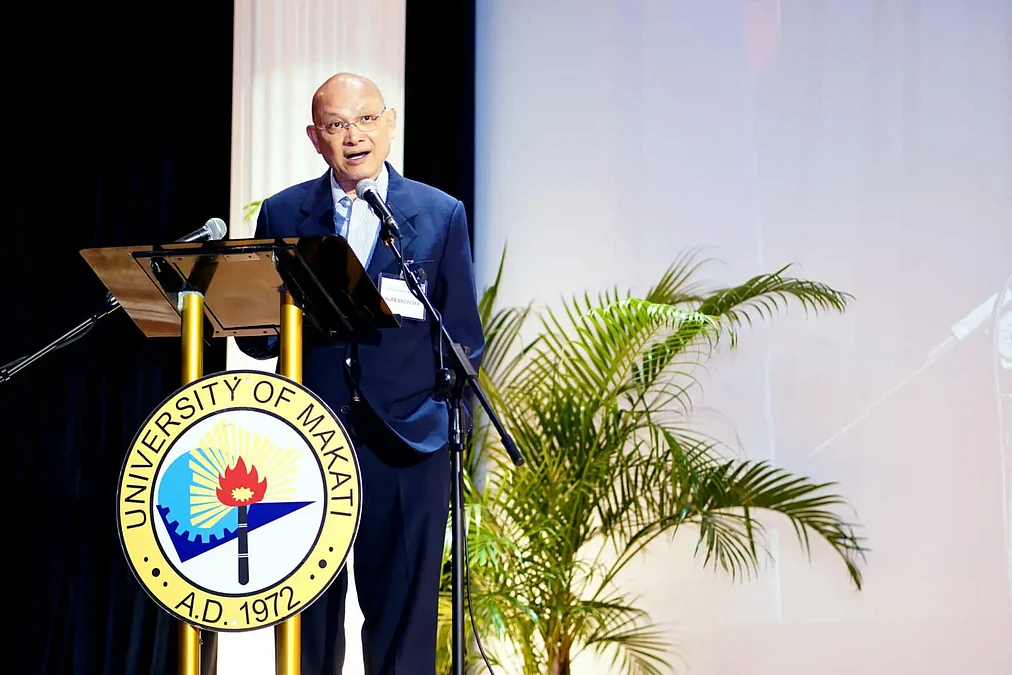By Jason Mago
Copyright tribune

For Alex Escucha, the language of economics has always been more than just a collection of figures, charts, and projections. It is the nation’s story told through numbers — a narrative of progress, missteps, and possibilities for the future. And it is a story that, for him, must always be told with honesty.A past president of the Philippine Economic Society, Alex has spent decades studying the country’s fiscal challenges and advising both policymakers and the private sector. His reputation rests not on rhetoric, but on a meticulous habit of grounding every argument in complex data. “When I guest or write, you will note that in my writings, I don’t just offer opinions. I sort of go into the numbers first,” he said.From fiscal deficit to reformAlex recalls vividly the turning point in the early 2000s, when the Philippines faced a deep fiscal crisis during the time of former President Gloria Macapagal-Arroyo. “It was during that time that I got to know and work with Joey Salceda because he was in Congress at that time,” he shared. “If you recall, that was also the year that the UP School of Economics professors produced a white paper because we had a really bad fiscal deficit at the time. And the call to action there was how to turn around the primary deficit into a primary surplus.”That call led to a landmark reform: raising the value-added tax from 10 to 12 percent. It was a politically difficult decision, but the results were clear. The country’s debt-to-GDP ratio at 63 percent, once dangerously high, began a steady decline, reaching a historic low of 39 percent by 2019, just before the pandemic forced massive government borrowing.The lesson for Alex was simple: decisive fiscal policy, though unpopular, can lay the foundation for growth.Selling Phl’s story abroadHis career at China Bank later placed him at the center of the country’s financial storytelling. As head of investor relations, Alex traveled to Singapore, Hong Kong and Tokyo, facing analysts and fund managers whose perceptions could sway billions in investment.“At that time, the regional analysts were noting that the Philippines was lagging behind in infrastructure,” he said. “During GMA and PNoy (Aquino) time, the spending of infra to GDP was basically only 1 to 2 percent of GDP, which at that time was being characterized as very low, in fact, criminally low.”Even as the country enjoyed steady growth, the lack of infrastructure became a glaring weakness. For Alex, the irony was painful: just as infrastructure spending was beginning to increase in recent years, evidence mounted that much of it was being lost to corruption.“If more than half of it is being stolen, your effective spending to GDP is only back to 3 or 4 percent,” he lamented. Following the numbers, not the politicsAlex has earned a reputation for being uncompromising when it comes to budget analysis. He is among the rare few who actually downloaded and read the full 500-page Philippine Development Plan, the document that charts the nation’s long-term ambitions.The plan sets the goal of achieving “AmBisyon 2040” — raising the Philippines to upper middle-income status with per capita income growing at 7 to 10 percent annually. But Alex is quick to point out that ambition and reality have diverged.“Well, two weeks ago, Secretary Arsi Balisacan already admitted that is no longer attainable,” Alex said. For him, the disconnect lies not in the vision, but in how the budget — the financial translation of government priorities — is handled.“In principle, the House conducts their own hearings literally hundreds of hours, the Senate conducts its own hearings… and then there is a bicameral conference committee that is supposed to only reconcile provisions,” he explained. Reallocation not reconciliation“But in the case of the budget, it is not the case. What happened in the bicameral committee was not just a reconciliation of items. There was a reallocation.”Alex tracked how counterpart funding for flagship infrastructure projects in 2025 was instead shifted into unprogrammed appropriations, forcing agencies to scramble for money from other sources. This led to controversial fund diversions, including billions from PhilHealth and the Philippine Deposit Insurance Corporation (PDIC).“Even Senator Ping Lacson already gave a speech that said that what they did to PhilHealth was illegal,” Alex recalled. “I am 99 percent sure that the Supreme Court will rule that what happened to PhilHealth was illegal and unconstitutional.”Advocacy in retirementThough retired, Alex remains deeply engaged in public discourse. His writings dissect national budgets, expose questionable reallocations, and highlight gaps between plans and execution. He does not hesitate to call out what he sees as systemic corruption.“Out of the one trillion that was reallocated over the last three years, the President vetoed only 26 billion,” he noted. “It looks like nobody complained in 2023, so they increased it again in 2024, and then in 2025, sinagad… (it was pushed to the limit). Even PDIC and PhilHealth, they took funds.”For Alex, fiscal accountability is not just an economist’s concern. It is a moral issue, touching the lives of ordinary Filipinos who depend on infrastructure, healthcare, and education that too often remain underfunded.Alex’s critics sometimes say he can be relentless, but for him, there is no other way. Numbers do not lie, and his job, as he sees it, is to follow them wherever they lead. His personal advocacy after retirement has focused on ensuring that the nation’s development plans are not just lofty documents, but living blueprints that guide honest governance.“Towards the end of 2022, I downloaded also with much effort the 197 flagship infrastructure projects,” he said, his voice still carrying the persistence of a man unwilling to accept vague answers. “As Secretary Vince (Dizon) said, it should be sacred.”Yet what happened in the following budget cycles was, for him, proof of how fragile those commitments can be. “What Congress did for the 2024–2025 budget, the counterpart funding that are supposed to be supported also by the foreign funding, ayun pa yung tinanggalan ng pondo at nilagay sa unprogrammed appropriations,” he noted, stressing that the guarantees meant to sustain flagship projects were effectively stripped. Congress even inserted a rider in the 2024 budget instructing the Department of Finance to “look for other sources of funds” to make up for the cuts.What sets Alex apart is that he does not simply lament corruption or inefficiency. He documents them, line by line, peso by peso. His is not the voice of cynicism, but of vigilance — a reminder that in the end, the numbers will reveal whether promises have been kept or broken.And as long as those numbers matter, Alex will keep speaking, guided not by political tides but by the integrity of the data itself.



